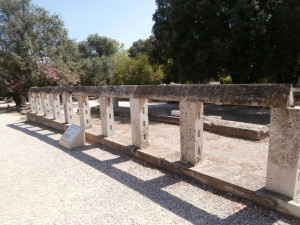Article IV, Section 8 of the California Constitution requires that to be passed, a bill must first be read:
No bill may be passed unless it is read by title on 3 days in each house except that the house may dispense with this requirement by rollcall vote entered in the journal, two thirds of the membership concurring. No bill may be passed until the bill with amendments has been printed and distributed to the members.
The point of a public reading is to ensure that both the legislators and the public had access to proposed laws before they were enacted. The requirement of publication is an ancient one. The great fourth century statesman and foe of Alexander the Great, Demosthenes, wrote that Solon imposed a nearly identical requirement in 403 BCE:
καὶ πρὸ τούτων γ᾽ ἐπέταξεν ἐκθεῖναι πρόσθε τῶν ἐπωνύμων καὶ τῷ γραμματεῖ παραδοῦναι, τοῦτον δ᾽ ἐν ταῖς ἐκκλησίαις ἀναγιγνώσκειν, ἵν᾽ ἕκαστος ὑμῶν ἀκούσας πολλάκις καὶ κατὰ σχολὴν σκεψάμενος, ἃν ᾖ καὶ δίκαια καὶ συμφέροντα, ταῦτα νομοθετῇ. ("Moreover, before these proceedings, Solon ordered that the laws should be exposed before the statues of the eponymous heroes and handed in to the town-clerk to recite them at the meetings of the Assembly, so that each of you may hear them more than once and digest them at leisure, and if they are just and expedient, may add them to the statute-book.")
Demosthenes, Speech 20 (Against the Leptines) (translation by C.A. Vince and J.H. Vince). The monument to the eponymous heroes, pictured below, once supported statues of the heroes for which each of the ten tribes of Athens were named.



.png?width=100&height=100&name=corporate_law_blogs%20(1).png)